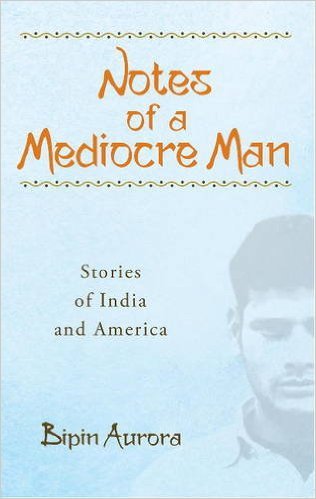By BIPIN AURORA
From Notes of a Mediocre Man: Stories of India and America
Ramesh Thakur had three houses—one in Defence Colony, one in R.K. Puram, and one in Malviya Nagar. But he was not happy.
“So much dusting, Chandar. I go to each house once a week. I dust, I dust. The sofas, the tables, the mantelpiece. I do not forget anything.
“But it is hard work, Chandar. It is not easy.”
But still I was happy for him. He was retired, he needed something to do. This kept him busy. He had three houses: there was security in that. He had some place to go three days a week: this kept him busy, there was security in that as well.
He complained about the dusting, yes. He complained about the traffic and the pollution. But he had something to do.
One day he was at the DESU (Delhi Electric Supply Undertaking) office in South Delhi. There was a problem with the electric bill for one of the houses, the bill obviously wrong. It was overstated by three thousand rupees. He went to discuss the bill; they said that he was at the wrong office. He went to the second office; the girl was sick, she had not come in today. He went to the third office; there were six people in line ahead of him. He waited patiently, and then impatiently, for fifty minutes. At last his turn came. But just as he arrived at the glass window, a cardboard sign was put up behind the window. “Tea,” it said simply.
“What is this?”
“The hours, sir, the hours of operation are posted.”
He looked at the hours posted on the wall to the right. “Open 10 AM -12 PM,
2 PM – 4 PM.” At present it was 11:20.
He looked at his watch to confirm the time and looked again at the sign. “You should be open,” he said.
“It is time for tea, sir.”
“What is this?”
“A man needs his tea, sir.”
Again he looked at his watch. Eleven-twenty, that is exactly what it said. Eleven-twenty, not twelve. Not even close to twelve.
Ramesh Thakur felt the blood rush to his face. “I have been to three offices already. I have received a bill. The bill is a mistake. A mistake.”
“A hypothesis, sir.”
“What is this?”
“You say, sir, that the bill is a mistake. That is a hypothesis.” The host repeated the same word. He seemed to take pride in it.
Ramesh Thakur again felt the blood rush to his face. He was about to lose his temper. He should not do it. He wanted to tell the man many things. The man should be told many things. But what would that accomplish? No no, better to control himself.
“Hypothesis, sir, the world is filled with hypotheses.” Thus continued the other. “Men make statements but they are not scientific. They do not verify them. No observation, sir, no testing. And so the hypothesis remains that: a hypothesis. Nothing more.”
Ramesh Thakur looked at the other, aghast. The impudence of the man, the audacity. You go from house to house, you dust. You dust the sofas, the tables, the mantelpiece. You go from office to office trying to solve a simple problem. A problem that you did not create. A problem that should be solved. And yet, and yet . . .
The blood had risen to Ramesh Thakur’s face. But what need was there for a fight? A fight, did it not turn into a war? A war led to more wars, more wars led to more wars still. No no, better to control oneself. Better to . . .
“Tea, yes yes,” he suddenly added, “every man deserves his tea.” He did not want to speak in this way but somehow the words came out. And he knew (or did he?) that it was the right and prudent thing to say.
“Every man deserves his tea. Please go and drink. Please go and enjoy. I will stand here, wait. When you come back, we will talk.”
“Yes yes,” the other added, more accommodating now, wagging his head, even that. “We will talk. The day is young. Men need to talk. If they do not talk . . .”
The sentence was left dangling there, unfinished. And the other left, left to drink his tea.
Ramesh Thakur watched him from the back as he walked away. The man walked into some back room to the right. The man greeted someone in the room—who, Ramesh Thakur could not say. Then the man gently kicked the door closed behind him. Lucky man! Impudent man!
Ramesh Thakur stood at the narrow blue counter. He tapped impatiently on the counter with his fingers. But then he realized what he was doing—he stopped the tapping. “Better to be patient,” he said. “Patience is a virtue. And impatience—did not even our teacher tell us once?—is a vice.”
*
Ramesh Thakur waited, waited. Five minutes passed, ten. Fifteen minutes passed. The door in the back opened a peep. Then it closed again. The blood rushed to Ramesh Thakur’s face. He controlled himself. Consciously, deliberately, he controlled himself.
Twenty minutes passed. Twenty-one. Two more. The door opened again—this time more, more. Someone—was it the esteemed one himself?—emerged at the doorway, stretching wide his arms on each side.
Ramesh Thakur began to tap on the counter, then realized what he was doing and checked himself. There was some lint on his shirt, he flicked at it with his right hand. His heart was racing. A lackey—a low-class lackey—and he was putting him through all this.
The lackey—the esteemed one—was indeed making his way from the back room. He came in through the entrance to the right. He walked slowly, slowly, to the counter. The cardboard sign was there. Consciously, deliberately—slowly—he began to lift it.
The people in line behind Ramesh Thakur brushed against him. “Please, please,” said Mister Thakur in some anger, turning slightly, his voice rising. “I have been waiting for over one hour. Kindly wait—kindly wait for your turn.”
The others were not so impressed.
“Kindly wait. Please wait.”
A few controlled themselves, but others, propelled perhaps by still others behind them, kept pushing.
“Order! Order!” called out the lackey. “Everyone will get his turn.” He looked at the clock on the wall. “Only fourteen minutes before lunch. Time is precious. Control yourself. If you wish to be served, kindly—control yourself.”
The voice of the lackey—screechy, loud—seemed to have had an effect. Mister Thakur had spoken up twice: nothing. But this lackey, this lackey . . .
Time is precious: Mister Thakur was tempted to scream at the other, but beggars cannot be choosers. He controlled himself. Again he did it.
The other pulled up to the glass window, spoke through the metal grilles in the middle.
“What is the problem, sir?”
“This bill—as I was saying before—the bill is a mistake.”
“How is it a mistake?”
“As I was saying before, before the tea break” (tea break: he felt the words to be unnecessary), “the bill is an error, an obvious error. It is overstated by three thousand rupees.”
“Three thousand rupees?”
“The normal bill, you see—I have brought the bills for the past month—the month before that—the month before that . . .”
“Yes yes, go on.”
“The normal bill is 300 rupees. This bill is 3,300. A computer error, I am sure. A human error. An extra ‘3’ was added.”
The other stood on the other side of the glass window, examined the bill.
“Did you have a big function?”
“A big function? No no, of course not.”
“A birthday party—a lot of lights. A wedding perhaps.”
“No no, there was no wedding.”
“You have daughters? A son?”
“Why is that important?”
“They are young, they need to be married off. A party is held—a big party. Guests come—important guests. They come from all parts of the country. There is a big electric bill.”
Mister Thakur looked at the other. “No no, no such thing.”
“There is a function, yes. The people come—they like to come. From Poona they come, from Patiala. From Kanpur they come, from Karnataka. They come, they come. From Manipur, from Madras . . .”
Mad—was this man mad? Did he like geography—did he want to show off his knowledge of geography?
“Guests, I told you, there were no guests. Party, function, there was no such thing.”
“Why then is the bill so big?”
“That is my point—exactly my point. It is a mistake, an error.”
The other looked at the bill again.
“A hypothesis,” he said.
“A hypothesis?”
“The bill is in error, you say. A mistake. A hypothesis—nothing but a hypothesis.”
A hypothesis: was he back to that same thing again?
“I have showed you the bills from the previous months. Three hundred rupees. Now—3,300 rupees. It is a big difference. The same house: two bedrooms, two baths, a kitchen. It is a mistake—it has to be.”
“Two bedrooms, you say, two baths. Attached baths, one to each bedroom?”
“Attached, not attached, what difference should it make?” But Mister Thakur controlled himself. “One bath attached. One not attached.”
“Attached bathrooms, Mister Thakur, they have a much greater value in the market.”
“Yes, yes, I agree.”
“But only one bath is attached. The other is not so.”
And the other seemed suddenly lost in thought. He looked into space, the thin air. He seemed almost saddened by the situation. As if attached bathrooms were the most important thing in the world. As if one bathroom not being attached was a sadness, a loss, and not just a general sadness and loss but a sadness and loss to him.
Mister Thakur stared at the other. Was it in disgust? Was it in awe? He had come to the office to point out an error, an obvious error. And now this. Had the world gone mad? Had it gone completely mad?
They talked for some time. The people in line behind Mister Thakur began to grow impatient. They had always been impatient—now they were only more so.
The lackey looked at the bill a second time. He looked at the bill for the previous month—the bill for the month before that. He took a wooden ruler and placed it under some line on the first bill. The second bill: the same. The third bill: the same. Then he lined up the bills together, again put his ruler in the needed places.
He did this for some time. At last he looked up at Mister Thakur, shook his head.
“The bills do not match,” he said with some finality.
“Exactly,” said Mister Thakur. “Exactly. That is just my point.”
There was a pause.
“Two bills are the same, one is bigger.”
“Exactly, exactly. That is just the point.”
The lackey seemed lost in thought. Was he thinking of something deep? Was he about to reach a decision? Had he reached it already?
At last he looked up, he smiled at the other. “Are you sure there was no function?”
“No no, no function.”
“No wedding, no party?”
“No no, nothing like that.”
“We must have a meeting on this.”
Meeting: Mister Thakur was intrigued by the word. There would be progress—a good thing. But this meeting, when would it be held? Where? Who would be present?
Mister Thakur was about to give voice to these questions. But the other was wise—he spoke up instead.
“Lunch!” he said suddenly.
“What is this?”
“Lunch!” he said.
There was a short pause.
“It is twelve o’clock, Mister Thakur.” He pointed to the clock on the wall. “One minute past. I have already overworked. There are rules here, guidelines. I cannot contravene the guidelines.”
The other had already taken his cardboard sign—a different sign this time—and put it on the glass behind the window.
“LUNCH,” it said in block letters.
“The Bill” is excerpted from Bipin Aurora’s new collection of short stories, Notes of a Mediocre Man: Stories of India and America, out today. Buy it here.
Bipin Aurora has worked as an economist, an energy analyst, and a systems analyst. His fiction has appeared in Quarterly West, Epiphany, Harpur Palate, Prism Review, Southern Indiana Review, North Atlantic Review, Quiddity, Puerto del Sol, Southern Humanities Review, Rosebud, Michigan Quarterly Review, Glimmer Train, Southwest Review, Witness, The Chattahoochee Review, New Orleans Review, and Eclipse. Another story was recently selected as a finalist in the Nimrod annual Katherine Anne Porter Prize for Fiction. His short story collection, Notes of a Mediocre Man: Stories of India and America, was published in March 2017 by Guernica Editions.




